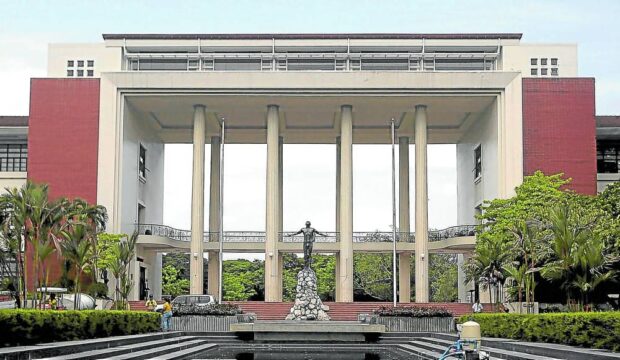
The University of the Philippines – Diliman campus (INQUIRER FILE PHOTO)
MANILA, Philippines – Officials of the University of the Philippines, STI College and De La Salle University laid out their stand on proposed economic provisions to the 1987 Constitution during the Senate’s hearing on Resolution of Both Houses No. 6.
UP President Atty. Angelo Jimenez said the university stands by its mandate not only to be a national university, but also a global university. To support his statement, Jimenez said UP has over 400 partnerships in 47 countries all over the world.
Jimenez pointed out that the Constitution does not oppose foreign participation in the educational system.
“It is our position, your honors, that the more important question is what do we need from them? Or what kind of foreign equity,” he said.
According to Jimenez, talent today knows no nationality.
“Many countries are recruiting the best talents all over the world to further their own national interest. Let me also tell you [about] a development in the foreign field of education that is directly related to the UP: Today I am getting a lot of suggestions and even suggestions from foreign schools who have mature technology that they felt that we might be interested in, particularly in science and technology,” he explained.
Jimenez ended his statement by emphasizing that the world is aging and that UP is looking forward to filling in and increasing its engagement with the rest of the world.
Why not focus on basic education?
STI College iACADEMY Chief Operating Officer Raquel Perez said the Philippine government should first address pressing issues hounding basic education.
“As we navigate through this discourse, it is imperative that we remain steadfast in our commitment to uphold the interest of our nation’s youth and the future generations that they represent,” said Perez.
Perez pointed out that providing excellent facilities and pushing for tertiary-level interventions are proven insufficient without a strong foundation on basic education.
“Firstly, inadequate resources such as classroom facilities continue to hinder the effective delivery of education in many parts of our country. The lack of sufficient infrastructure not only limits our access to quality education but also compromises the learning environment of our students,” she said.
“Second, the issue of teacher quality is of paramount importance in sharing the educational landscape of our nation,” Perez added.
She then stressed that their stand is clear that the current problems plaguing the education sector “do not necessitate Charter change” but rather “demand greater support and attention directed to education.”
“We acknowledge the proposal of Charter change, particularly regarding the ownership and management of the educational institution. While there may be arguments in favor of relaxing restrictions on foreign ownership, we must exercise caution and prioritize the preservation of Filipino values and the cultivation of national identity,” she said.
Perez said the Philippine government should not overlook existing challenges by diverting attention towards Cha-cha.
She then cautioned that while foreign investment in higher education may bring about certain benefits, the country must remain vigilant against its potential pitfalls.
DLSU, represented by its Chairman on the Committee on National Issues and Concerns, Dr. Jazmin Llana, has yet to finalize its position on the issue.
“I can provide a short answer and I am confident that the University will go along with this: No, we don’t need any Constitutional change in order to address the education crisis,” she said.
Llana did not provide more information on their supposed stance, but she underscored that governing bodies of the University will be discussing the issue in order to submit a position paper to the Senate.
“An open mind”
Meanwhile, Senator Sonny Angara, who is spearheading the discussions as chairperson of the Senate subcommittee on constitutional amendments and revision of codes, maintained the importance of maintaining an “open mind” in connection with the proposed amendments to the economic provisions of the 1987 Constitution.
“This is the first time since 1987 that we’ve been discussing the economic amendments in earnest or in detail. It took us this long because the Charter debate was poisoned by political and personal ambition. That’s the reality,” said Angara.